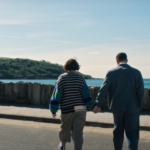
Warfare filmmaker Alex Garland has confirmed rumours that he ghost-directed 2012’s Dredd, even though Pete Travis is listed in the credits.
Before Alex Garland became an acclaimed director, he was a novelist and then screenwriter. However, the Civil War filmmaker’s step into directing stemmed from – in part at least – a desire to have to not relinquish control over the creative process once cameras start rolling, something most writers simply have to accept as the way things are.
With 2012’s Dredd, Garland was determined for this to not be the case, and rumours have long suggested the working relationship on set between he and Pete Travis – the film’s credited director – was not as clean-cut as most film productions. A few years ago, the film’s star Karl Urban publicly stated that Garland directed the film, which did little to dampen the speculation.
Years later, Garland has finally opened up about the process in a career retrospective with GQ, stating that “something would be going wrong, or I would feel something was going wrong, and I saw the execution of scenes, and I would be thinking, ‘That’s not really what that scene is like, it’s missing this key component part, and it doesn’t quite make sense to me.’
While he doesn’t mention Dredd specifically, Garland admits to having ghost-directed in the past, before explaining that on that film specifically, he and Travis agreed to take an unorthodox approach modelled on the way things are done in television:
“Television is not so much different from film that magically it’s the writer/showrunner and now magically it’s the director,” he says, “and some people I’m working with, their principle was ‘Well, why don’t we take that concept from television and use it in film.’ For complicated reasons that just didn’t work. It just created a bloody mess.”
Read more: Civil War, Annihilation, and how Alex Garland explores the dark side of humanity
We can certainly see how applying the showrunner model to film, which already has a distinct authorial voice in the form of the director, could very easily muddy the decision-making waters. As Garland points out, it didn’t really work and ultimately led to him deciding to direct as well as write.
“Within this is a disservice to Pete Travis, who is the credited director, who did some fundamental, crucial things, and he deserves that title,” he adds. “He was put in an absolutely impossible situation, and retrospectively, the longer I’ve worked, the more ridiculous I think it was. After the experience of making Dredd, what I said is I’m not doing that again. Just let me do that job, let’s simplify this.”
Last year, Dredd co-producer Jason Kingsley confirmed to Film Stories that Garland “did quite a lot of the directing” on the movie, and added that one of the behind-the scenes problems was the decision to shoot it in 3D.
“It was filmed in 3D, and they had all sorts of problems with the technology,” Kingsley told us. “Apparently, it was a nightmare… [someone] told me that, if it hadn’t been filmed in 3D, it could have been made for half the money.”
Dredd didn’t land at the box office (“Nobody gave a shit about 3D anymore,” Kingsley said), although the film picked up a loyal cult following in the years following its release. It also launched Garland’s directing career, which has most recently brought us Warfare, releasing tomorrow (18th April) in UK cinemas. He’s returned to a form of co-directing with that project but we’re sure having learned from Dredd, the arrangement with Ray Mendoza was established with greater clarity this time. Its reviews – including ours – certainly suggest so.
As for Dredd, Kingsley still holds out hopes for a sequel, with his company Rebellion Film Studios now owning the movie rights. “We’ve got all the rights back,” he said, “and maybe one day we’ll make a sequel. That’d be nice.”








